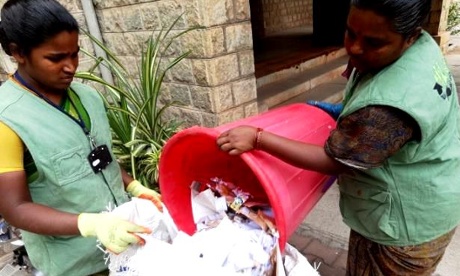
Bangalore’s streets have always been a concoction of smells, from roasting coffee beans to the doughy sweetness of local bakeries. But the one smell that will probably invade your senses today is the foul stench of garbage.
While most of us would crinkle our noses at this stink, waste-pickers busily scavenge through the garbage heaps every day, looking for recyclable items that can help them earn a living. In doing so, they also do the environment a favour.
Having realized their potential, Bangalore, the IT hub of India, is now using its expertise to empower these entrepreneurial environmentalists and solve the city’s garbage crisis.
The solution is simple, yet innovative – a cloud-based platform called I Got Garbage (IGG), that brings the informal sector of waste recyclers in Bangalore face-to-face with the city’s garbage generators.
“Currently, their work location is the garbage heap. But we felt that they needed to come to the beginning of the supply chain, which is my house and your house,” says Prashant Mehra, chief architect of IGG at Mindtree Ltd.
Bangalore’s 8.5 million residents generate more than 4,000 tonnes of solid waste every day. Almost 90% of this ends up in landfills, despite being largely recyclable.
To control this menace, Bangalore became the first metropolis in the country in 2012, to make waste segregation at source compulsory. But in the absence of implementation, the mandatory rulings had little effect. Predictably, copious amounts of mixed waste continue to fill up overflowing landfills.
To change this, IGG has partnered with six organisations actively working to improve the city’s waste situation. One such partner, Hasirudala (translating as “green force”), has engaged with some of the city’s 20,000-odd waste-pickers for the last three years.
In one of their initiatives, Hasirudala helps apartments hire the services of waste-picker franchises, in a "pay-per-kilo" model. Under this model, uniformed, trained waste-pickers collect segregated waste from apartments, selling recyclable dry waste to scrap dealers, composting the wet waste at the apartments, or sending it to government-run composting centres.
The residents, however, pay for their reject waste. The larger the amount of reject waste, the more they pay. “In doing so, we really discourage the amount of waste that goes to the landfill,” says Nalini Shekar, co-founder of Hasirudala.
It is this system that IGG started incorporating into their platform since January 2014. After six months of digitising and organising data into IGG, MindTree finally released its public interface in June.
Both citizens and waste-recyclers form an important part of IGG. Citizens can use the intuitive website to hire services of waste-pickers, volunteer to become waste auditors, track their carbon footprint, or even take a day-long trash trail meant to educate people about how trash moves from homes to landfills.
Waste-recyclers can use IGG to increase their efficiency, and ultimately their income. IGG’s mobile applications help them track their trash-flow and trash-collecting routes. In fact, a scrap dealer in the city and his team of MBA graduates is using one of the apps to geo-tag, digitise and map all of the city’s 5,000-odd scrap dealers.
“This will help all the waste-pickers connect with the nearest scrap dealers, who will then become the first sale point,” says Mehra. “This will reduce the distance they need to travel each day.” These apps, Mehra hopes, will bring technology directly into the hands of their target clients - the waste-recyclers.
So far, the average monthly incomes for the 5,251 waste-pickers on-board IGG have almost doubled from Rs 4,828 to Rs 8,834, and 2,350 tons of waste has been recycled.
Mehra, however, is cautious about scaling up too rapidly. “IT can help the garbage problem by creating repeatable solutions. But it will take a while before we can say that the Bangalore solution is a repeatable one. In addition, if all of Bangalore starts segregating, the local ecosystem will struggle. It doesn’t have enough processing capability yet. So we have to bring in big recyclers who will need predictability, and for this we need more data.”
Despite the challenges, shifting from a client-base of corporates to waste-pickers has only made Mehra happier. “This is probably one of the most important projects I will ever work on,” he says.

